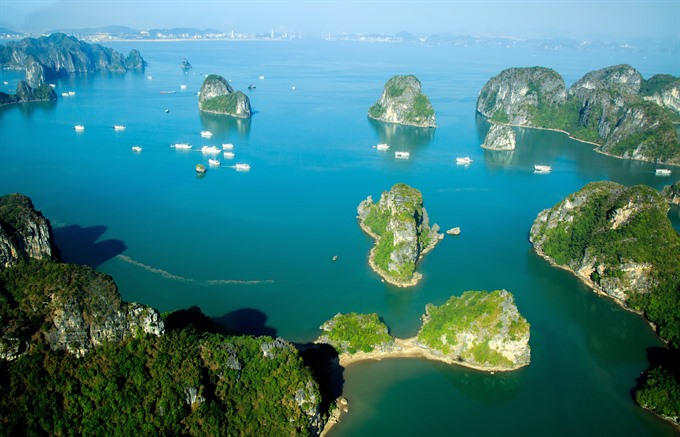 Environment
Environment

As many as 1,625 people has engaged in the Hạ Long-Cát Bà Alliance and 109 people have benefited from sustainable management and conservation of the resources with the project’s support.
 |
| United Nations Educational, Scientific and Cultural Organization (UNESCO) recognised Hạ Long Bay as Natural World Heritage Site in 1994. The steep limestone islands rising out of the green waters of Hạ Long Bay make up one of the world’s most recognisable landscapes — VNA/VNS Photo Trung Nguyên |
QUẢNG NINH — Some 1,625 people have engaged in the Hạ Long-Cát Bà Alliance and 109 people have benefited from sustainable management and conservation of resources with the project’s support.
This was announced by Nguyễn Thu Huệ, director of Centre for Marine Life Conservation and Community Development (MCD) at a meeting on Thursday held in the central province of Quảng Ninh to review the Hạ Long-Cát Bà Alliance.
The three-year project, with financial support worth US$970,000 from USAID, was established to build a partnership among government, businesses and community leaders to preserve and protect Hạ Long Bay and Cát Bà Archipelago.
The project has trained 842 people on topics related to natural resource management and biodiversity conservation. In addition, it helped 206 others access modern technology and new management methods, Huệ said.
The project has contributed to strengthening planning and management of sustainable aquaculture in Hạ Long Bay along with heritage preservation.
It mobilised the community in the planning and piloting of sustainable aquaculture, particularly in Vung Viêng fishing village.
Thanks to the project, local awareness of climate change and how to cope with it and knowledge on resource conservation and development have increased, she said.
Through training, the project has helped establish groups of advocators in localities who can disseminate information on environmental issues to the community.
The project has supported the development of an environmentally friendly agro-forestry model and technical training on the care, exploitation, management and protection of forests.
Raising knowledge for local households in animal husbandry and cultivating luồng (dendrocalamus membranaceus munro, a kind of bamboo) aimed at improving their livelihoods, Huệ said.
Besides dissemination activities, the project also helps local residents access markets through meetings with enterprises and establishing product development groups. This aims to improve relationships between farmers and distributors.
According to Đặng Huy Hậu, vice chairman of Hạ Long City People’s Committee, the project has brought economic and environmental benefits to locals, contributing to the protection of the Earth and tackling climate change.
He emphasised that the Hạ Long-Cát Bà Alliance has connected businesses and communities in Quảng Ninh Province and Hải Phòng City to improve environmental quality and protect the world natural heritage in the face of pollution caused by aquaculture, wastewater and tourism.
Local authorities have committed to supporting the expansion of the project and settled shortcomings to build on the gains the project has made, Hậu said.
Aquaculture associated with sustainable tourism development will be expanded in Hạ Long and Cẩm Phả cities as well as Vân Đồn and Tiên Yên districts, he added.
Participants at the meeting agreed that it was necessary to set up a strategic management system and strengthen multi-stakeholder co-ordination based on initiatives and interventions regarding environmental protection.
The Hạ Long-Cát Bà Alliance - an initiative launched by the International Union for Conservation of Nature and the MCD, has become a strong catalyst in improving environmental management and protecting Hạ Long Bay World Heritage Site and Cát Bà Archipelago since June 2014.
In 2014, Cát Bà was nominated as a world heritage site but failed to be recognised.
In 2015, the alliance set up a leadership committee to improve granting sustainable tourism certificates to tourist boat businesses while supporting the United Nations Educational Scientific and Cultural Organisation in Hạ Long Bay management and recommendation to enlarge the World Heritage Site, comprising Cát Bà Archipelago.
It was decided at the fourth leadership committee meeting of the Alliance held in Hải Phòng City in May this year that Hải Phòng City People’s Committee will prepare the renomination dossier for Cát Bà Archipelago and submit it to the Ministry of Culture, Sports and Tourisms for submission to UNESCO in September. The final dossier will be filed on February 1, 2018.
Cát Bà Archipelago covers an area of more than 320sq.km with 388 islands and islets. In 2004, it was recognised as a World Biosphere Reserve by UNESCO. — VNS




